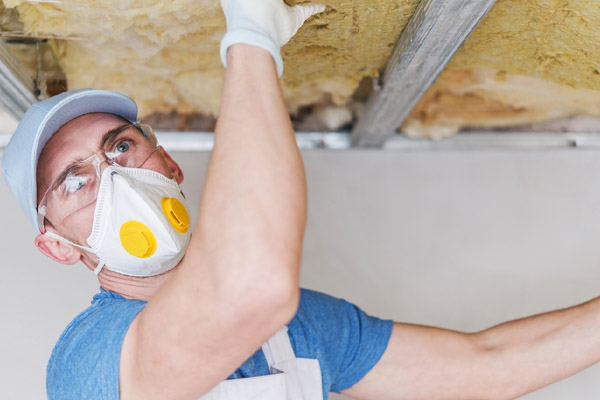Insulation Contractors Houston install and repair materials that maintain temperatures in ducts, pipes, structures, and mechanical systems. They also select insulation materials and review blueprints.
A good insulation contractor should be punctual, courteous, and respectful of your home. Ask for references and testimonials. An experienced contractor will know how to handle expanding foam safely.
When choosing an insulation contractor, it is important to find one with extensive experience in this type of work. This will ensure that they know how to properly install insulation and that the work is done correctly. In addition, an experienced contractor will be able to identify air leaks and other problems that might not be readily apparent.
Some contractors will offer to install all types of insulation, while others may specialize in a certain type, such as fiberglass or cellulose. You should be able to tell whether they have the right experience for your needs by asking them about their past jobs and whether they can provide you with references. If they can’t, you should consider looking for another contractor.
You can also ask friends and family members about their experiences with insulation contractors. They may be able to recommend a company that provided them with excellent service and craftsmanship. They can also tell you how well the contractor adhered to the contracted timeline and how responsive they were when it came to questions and concerns. In addition, you can also check with your energy provider to see if they have a list of suggested or approved contractors.
In addition to experience, you should choose an insulation contractor who is licensed. This will help protect you from scammers and unlicensed workers. The licensing requirements in your area may vary, but they should include proof of insurance and their certification number. Additionally, you should make sure that the contractor has the right equipment for working in tight spaces. This includes a respirator, airmovers, and other safety precautions.
Insulation contractors are responsible for insulating commercial and residential buildings. They use materials such as fiberglass, cellulose, and spray foam to reduce energy loss and create a comfortable environment inside. This helps reduce operating costs and increase productivity. Insulation also protects a building from weather conditions and prevents damage caused by fire or water.
The demand for insulation contractors depends on the overall level of activity in the general construction industry. It is expected that the industry will experience a mixed performance over the next five years, with increased activity in the commercial sector offset by a decline in residential housing market demand.
License
An insulation contractor’s license is a crucial qualification for the industry. Licensing ensures that insulation contractors are in compliance with local and federal regulations and adhere to established industry standards. It also helps them demonstrate their expertise and build client trust. Moreover, it helps them secure new business opportunities. However, it is important to note that licensing is not a substitute for experience.
A successful insulation installer business needs to have a strong unique selling proposition. It should also be able to attract customers with effective marketing strategies. It is also a good idea to create a professional website to promote the business and make it easy for potential clients to contact you.
Another important consideration for prospective insulation installers is whether or not they will need a state-specific business license. This will vary by jurisdiction, but the process of obtaining a license is usually relatively straightforward. It involves paying fees and submitting documentation to the appropriate government body.
Some states may require contractors to pass a certification exam or prove their proficiency in the field. The exam is a multiple-choice, closed-book examination that covers various aspects of insulation and construction. It is recommended to attend an exam preparation class to prepare for the test. These classes can help you prepare for the questions and provide a study guide to use during the exam.
You should also be sure to check the insurance coverage of your contractor. A reputable insulation contractor should have workers’ compensation and general liability insurance. You should also ask about their bonding requirements. This is a requirement in some states to ensure that the contractor will perform quality work and meet deadlines.
Finally, if you’re interested in becoming an insulation contractor, you should consider taking a course offered by a licensing instruction school. These courses are designed to help you prepare for the licensing exam and pass it successfully. They teach you the skills necessary for a successful career as an insulation contractor.
Insulation contractors install and repair materials that maintain the temperature in pipes, ducts, mechanical systems, and structures. They coordinate with plumbing, heating, and mechanical construction workers. They also read blueprints and select the proper insulation material for each job. These jobs are physically demanding, requiring significant stamina for bending and standing for long periods of time in small spaces.
Insurance
Insulation contractors either manufacture insulation products or offer contracting services to install a variety of insulation materials at residential and commercial locations. These types of businesses require a lot of upfront planning, monetary investment, and attention to day-to-day operational details. Mishaps happen, and if a mistake occurs that leads to injury, property damage, or legal fees, it can spell disaster for your business and livelihood. That’s why you should consider investing in several different insurance policies to protect your business from liability and risk.
Depending on your specific insulation contractor business model, you may need to secure several types of insurance coverage. For example, if you employ workers, you’ll need workers’ compensation insurance to cover medical expenses and lost wages in case an employee is injured on the job. You should also consider securing general liability insurance, which covers bodily injury and property damage resulting from your business operations. Additionally, you may want to consider transportation pollution liability coverage, which is necessary if your company transports potential pollutants from one scheduled location to another.
You’ll also need to consider commercial auto insurance, which is essential if you and your employees rely on vehicles to get to work sites. For example, suppose an employee is driving a truck full of insulation materials to a client and gets into a severe accident that damages the vehicle, injuries the driver and passenger, and causes extensive property damage to the client’s home. Your commercial auto insurance policy would pay for third-party bodily injury and property damage, as well as the value of any damaged equipment or inventory that was in the truck at the time of the accident.
You should also consider securing commercial property insurance, which is critical for insulation contractors that have offices, warehouses, and other physical spaces where they store equipment, supplies, materials, and vehicles. This type of insurance will pay for property loss caused by a variety of perils, including theft, fires, natural disasters, and vandalism. It’s also recommended that you invest in crime insurance, which mitigates financial losses resulting from internal theft, forgery, and other types of crimes committed by your employees or customers.
Reputation
Choosing the right insulation contractor is essential to your home’s or commercial building’s safety and energy efficiency. Insulation can help stabilize room temperatures, soundproof rooms, and protect structures from fire. It can also help reduce environmental pollution by decreasing energy consumption. Insulation contractors work to install and repair insulation materials in residential, commercial, and industrial buildings. They can help with new construction, additions, and renovations.
If you are looking for an insulation contractor to help with your remodeling project, it is important to check their license and insurance. You do not want to be held responsible if an accident occurs on your property. Make sure the company has workers’ compensation and general liability insurance. This will protect you in the event that one of their employees is injured while working at your home.
A good insulation contractor will be able to assess your home’s needs and provide you with a range of options that will meet those requirements. They should be able to explain the benefits and costs of each option and answer any questions you may have. They should also be able to offer a free consultation and estimate of your needs.
You can find a reputable insulation contractor by asking friends and neighbors, looking online for reviews, or getting a recommendation from your local utility provider. When you do find a contractor, ask for references from previous customers and check their licensing and insurance.
A qualified and licensed insulation contractor can ensure that your house is well insulated and can reduce your energy bills significantly. In the process, they can help you achieve a comfortable living environment and protect your valuables from damage. They can also help improve the efficiency of your air conditioning and heating systems by reducing their energy usage. In addition, they can also reduce outside noise and protect your building from water and air infiltration. Moreover, they can increase the lifespan of your heating and cooling systems. This will ensure that they remain operational longer and reduce your carbon footprint and energy bills. The industry’s revenue is closely related to the prevailing level of activity in the overall housing market, and it can benefit from improvements in the real estate sector.
